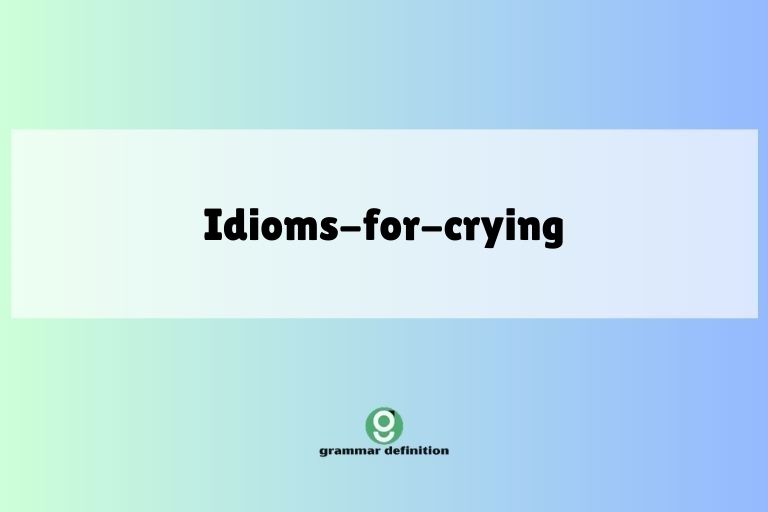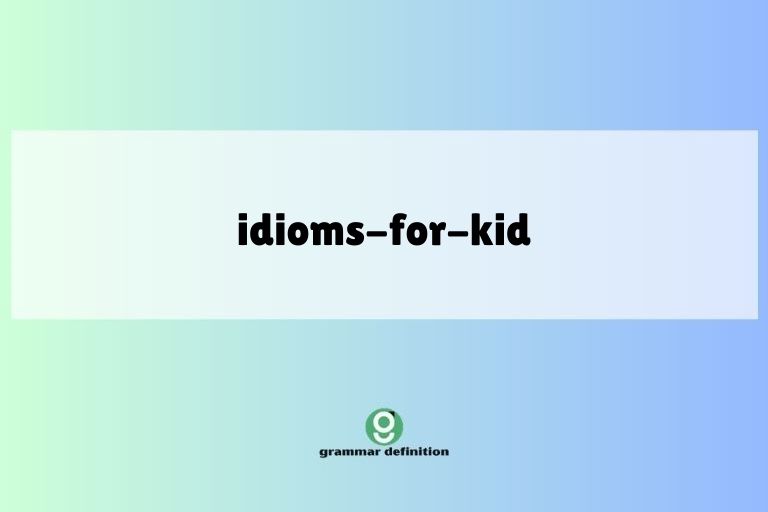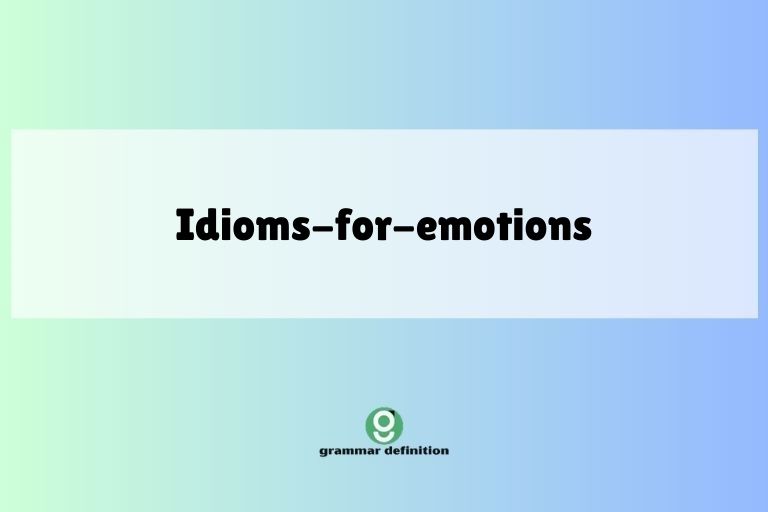Idioms for Hope: A Guide to Optimistic Expressions

Idioms add color and depth to the English language, allowing us to express complex emotions and ideas in concise and evocative ways. When it comes to hope, idioms offer a rich tapestry of expressions that capture the nuances of optimism, resilience, and anticipation.
Understanding these idioms not only enhances your comprehension of English but also allows you to communicate with greater precision and impact. This article is designed for English language learners of all levels, from beginners seeking to expand their vocabulary to advanced speakers aiming to refine their expressive abilities.
By exploring the definitions, structures, and usage of idioms related to hope, you’ll gain a valuable toolset for navigating conversations and appreciating the beauty of figurative language.
Table of Contents
- Introduction
- Definition of Idioms for Hope
- Structural Breakdown
- Types and Categories of Hope Idioms
- Examples of Idioms for Hope
- Usage Rules for Hope Idioms
- Common Mistakes with Hope Idioms
- Practice Exercises
- Advanced Topics
- FAQ
- Conclusion
Definition of Idioms for Hope
Idioms are expressions whose meanings cannot be understood from the literal meanings of the individual words. They are a form of figurative language that relies on shared cultural understanding.
Idioms for hope are a subset of these expressions that specifically convey a sense of optimism, anticipation, or reassurance in the face of uncertainty or adversity. These idioms often paint vivid pictures, drawing on metaphors and similes to evoke feelings of encouragement and resilience.
Understanding these idioms requires recognizing the underlying concept they represent, rather than focusing on the literal definitions of the words used.
The function of idioms for hope is multifaceted. They can be used to offer comfort, inspire action, or simply express a positive outlook.
In conversation, these idioms can add a layer of emotional depth and connection, signaling empathy and shared understanding. In writing, they can create a more engaging and memorable experience for the reader, adding color and personality to the text.
Furthermore, these idioms are frequently used in literature, speeches, and everyday conversations to convey complex emotions succinctly.
The context in which an idiom is used is crucial for understanding its intended meaning. The same idiom can have slightly different connotations depending on the speaker’s tone, the situation, and the relationship between the individuals involved.
Therefore, it’s essential to pay attention to the overall context when interpreting idioms for hope. For example, “to see the light at the end of the tunnel” might convey optimism in a difficult situation, but if said sarcastically, it could imply doubt or skepticism.
Structural Breakdown
The structure of idioms for hope varies widely, reflecting the diverse nature of figurative language. Some idioms are simple phrases, while others are more complex sentences.
Understanding the grammatical structure of these idioms can help learners use them correctly and confidently.
Many idioms for hope are based on metaphors, which are figures of speech that compare two unlike things without using “like” or “as.” For example, “to keep your chin up” uses the physical act of raising one’s chin as a metaphor for maintaining a positive attitude. Other idioms employ similes, which use “like” or “as” to make a comparison.
For instance, “to be as good as gold” suggests that someone is reliable and trustworthy, drawing a comparison to the value of gold.
The grammatical structure of idioms can also influence their usage. Some idioms are verbs, such as “to hope against hope,” while others are nouns, such as “a ray of hope.” Understanding the part of speech of an idiom is essential for incorporating it correctly into a sentence.
Additionally, some idioms are fixed expressions, meaning their word order cannot be changed without altering their meaning or making them nonsensical. For example, you cannot say “the tunnel at the end of the light” and maintain the original idiom’s meaning.
Here’s a breakdown of some common structural elements in idioms for hope:
- Verbs: These idioms often involve an action that represents hope, such as “to look forward to” or “to cling to hope.”
- Nouns: These idioms often refer to something that symbolizes hope, such as “a beacon of hope” or “a silver lining.”
- Adjectives: These idioms often describe something as hopeful, such as “bright future” or “promising start.”
- Prepositional phrases: These idioms often use prepositions to convey a sense of direction or movement towards hope, such as “at the end of the rainbow” or “in the hope of.”
Types and Categories of Hope Idioms
Idioms for hope can be categorized based on the imagery or concepts they evoke. Grouping idioms into categories can make it easier to remember and understand their meanings.
Light-Related Idioms
Light is a common symbol of hope, representing clarity, guidance, and the dispelling of darkness. Light-related idioms often convey a sense of optimism and reassurance.
These idioms often evoke a sense of clarity and optimism. They suggest that even in dark or difficult times, there is always a possibility of finding a way forward, a source of guidance, or a reason to be hopeful.
The imagery of light breaking through darkness is a powerful metaphor for overcoming challenges and achieving positive outcomes.
Weather-Related Idioms
Weather is another common source of imagery in idioms for hope, representing the changing nature of circumstances and the potential for improvement.
These idioms often draw on the contrast between unfavorable and favorable weather conditions. They suggest that even after periods of hardship or difficulty, there is always the possibility of better times ahead.
The imagery of a storm passing or a rainbow appearing after rain is a powerful metaphor for resilience and the eventual triumph of hope over adversity.
Future-Related Idioms
These idioms focus on the anticipation of positive outcomes and the potential for a better future.
These idioms often evoke a sense of anticipation and excitement about what lies ahead. They suggest that the future holds promise and that there are reasons to be optimistic about what is to come.
The imagery of planting seeds or setting sail on a new voyage is a powerful metaphor for taking action to create a brighter future and embracing the possibilities that lie ahead.
Struggle-Related Idioms
These idioms acknowledge the challenges and difficulties of life but emphasize the importance of maintaining hope in the face of adversity.
These idioms often convey a sense of determination and resilience in the face of adversity. They suggest that even when things are tough, it is important to hold on to hope and keep fighting for a better future.
The imagery of clinging to a lifeline or seeing a light at the end of a tunnel is a powerful metaphor for the strength and perseverance required to overcome challenges and achieve positive outcomes.
Examples of Idioms for Hope
The best way to understand idioms is to see them in context. Here are numerous examples of idioms for hope, organized by category, along with their meanings and example sentences.
Light-Related Examples
The following table provides examples of light-related idioms for hope, their meanings, and example sentences to illustrate their usage.
| Idiom | Meaning | Example Sentence |
|---|---|---|
| See the light at the end of the tunnel | To see signs of improvement after a difficult period. | After months of hard work, we’re finally starting to see the light at the end of the tunnel. |
| A beacon of hope | Something that provides guidance and encouragement. | The new medical breakthrough is a beacon of hope for patients suffering from the disease. |
| A glimmer of hope | A small sign that something positive might happen. | Despite the setbacks, there’s still a glimmer of hope that we can reach our goals. |
| Shine a light on | To reveal or expose something, often in a positive way. | The investigation will shine a light on the truth behind the scandal. |
| Brighten someone’s day | To make someone feel happier. | Her kind words really brightened my day. |
| New dawn | The beginning of a new and hopeful period. | The election of the new president marks a new dawn for the country. |
| See daylight | To come to fruition or be completed after a long period. | After years of development, the project is finally starting to see daylight. |
| The future is bright | The outlook is positive and promising. | With hard work and dedication, the future is bright for these young athletes. |
| A ray of hope | A small amount of optimism in a difficult situation. | The doctor’s positive diagnosis gave us a ray of hope. |
| Hold a candle to | To be comparable to something or someone. (Often used in the negative to express inferiority) | No other singer can hold a candle to her incredible voice. |
| Light at the end of the rainbow | Something good that is hoped for but is difficult to achieve. | Finding a cure for cancer feels like chasing the light at the end of the rainbow. |
| The sun will come out tomorrow | Things will get better in the future. | Even though today was tough, remember, the sun will come out tomorrow. |
| To look on the bright side | To focus on the positive aspects of a situation. | Even though we lost the game, let’s look on the bright side – we played well as a team. |
| To shed light on | To clarify or explain something. | The expert’s presentation shed light on the complex issue. |
| To throw light upon | Similar to “shed light on,” to clarify or explain. | New evidence has thrown light upon the circumstances of the crime. |
| To bring to light | To reveal or make something known. | The investigation brought to light several instances of corruption. |
| To keep the home fires burning | To maintain a sense of hope and normalcy during difficult times. | While her husband was away at war, she kept the home fires burning. |
| To see a brighter future | To anticipate a more positive future. | With education and hard work, they hope to see a brighter future for their children. |
| To have a light heart | To feel cheerful and carefree. | She approached the challenge with a light heart and a positive attitude. |
| To keep a light burning | To maintain hope or remembrance. | They kept a light burning in the window, hoping for his safe return. |
| To guide by the light | To lead or direct someone using hope or inspiration. | Her wisdom and experience guided us by the light through the difficult project. |
| To step into the light | To emerge from obscurity or difficulty into a better situation. | After years of struggling, the artist finally stepped into the light with her successful exhibition. |
| A guiding light | A person or thing that provides direction or inspiration. | His mentor was a guiding light throughout his career. |
These examples demonstrate how light-related idioms can be used to express hope in various contexts, from overcoming challenges to achieving success.
Weather-Related Examples
The following table provides examples of weather-related idioms for hope, their meanings, and example sentences to illustrate their usage.
| Idiom | Meaning | Example Sentence |
|---|---|---|
| Every cloud has a silver lining | There is something positive to be found in every difficult situation. | Even though he lost his job, every cloud has a silver lining; he now has time to pursue his passion. |
| After the storm comes the calm | After a period of turmoil, peace and tranquility will follow. | We’ve been through a lot lately, but after the storm comes the calm. |
| Calm before the storm | A period of peace and quiet before a period of disruption or trouble. | Enjoy the calm before the storm; the project deadline is approaching. |
| Weather the storm | To survive a difficult situation. | The company managed to weather the storm of the economic recession. |
| Fair-weather friend | Someone who is only a friend when things are going well. | He turned out to be a fair-weather friend; he disappeared when I needed him most. |
| A rainbow after the rain | A sign of hope and better times after a difficult period. | The birth of their baby was like a rainbow after the rain of their financial struggles. |
| Under the weather | Feeling unwell or slightly ill. | I’m feeling a bit under the weather today, so I’m staying home from work. |
| A storm in a teacup | A minor issue blown out of proportion. | Their argument was just a storm in a teacup; they’ll make up soon. |
| Clear skies ahead | A promising future with no apparent problems. | With the new policies in place, there are clear skies ahead for the company. |
| Chase rainbows | To pursue unrealistic or unattainable goals. | He’s always chasing rainbows, never focusing on practical goals. |
| Come rain or shine | No matter what happens. | I’ll be there for you, come rain or shine. |
| Make hay while the sun shines | To take advantage of favorable conditions. | We should make hay while the sun shines and get as much work done as possible. |
| When it rains, it pours | When bad things happen, they tend to happen all at once. | First, I lost my job, and then my car broke down; when it rains, it pours. |
| A rising tide lifts all boats | When the economy improves, everyone benefits. | The new economic policies are designed to create a rising tide that lifts all boats. |
| To be snowed under | To be overwhelmed with work or responsibilities. | I’m completely snowed under with paperwork this week. |
| To feel like a breath of fresh air | To feel refreshing and new. | Her positive attitude was like a breath of fresh air in the office. |
| To have one’s head in the clouds | To be unrealistic or impractical. | He always has his head in the clouds, dreaming of impossible things. |
| To be in the eye of the storm | To be in a place of calm during a period of turmoil. | Despite the chaos around them, they remained in the eye of the storm. |
| Sunshine on a cloudy day | Something that brings happiness or hope during a difficult time. | Her smile was like sunshine on a cloudy day. |
| To ride out the storm | To endure a difficult situation until it passes. | We just need to ride out the storm and things will eventually get better. |
| To have the wind at one’s back | To have favorable conditions or support. | With the new funding, the project has the wind at its back. |
| To be a ray of sunshine | To bring happiness and positivity to others. | Her cheerful personality makes her a ray of sunshine in the office. |
| A break in the clouds | A moment of relief or hope during a difficult time. | The news of the ceasefire was a break in the clouds for the war-torn country. |
These examples illustrate how weather-related idioms can convey hope through the imagery of changing conditions and the promise of better times ahead.
Future-Related Examples
The following table provides examples of future-related idioms for hope, their meanings, and example sentences to illustrate their usage.
| Idiom | Meaning | Example Sentence |
|---|---|---|
| Look forward to | To anticipate something with pleasure. | I’m really looking forward to my vacation next month. |
| A promising start | A beginning that indicates future success. | The team’s performance in the first game was a promising start to the season. |
| On the horizon | About to happen or appear in the near future. | There are new opportunities on the horizon for graduates. |
| In the pipeline | Being planned or developed. | The company has several new products in the pipeline. |
| A bright future | A positive and promising outlook for the future. | With hard work and dedication, she has a bright future ahead of her. |
| The best is yet to come | The most positive experiences are still in the future. | Don’t worry about the past; the best is yet to come. |
| A new lease on life | A chance to start over and live a better life. | After recovering from his illness, he felt like he had a new lease on life. |
| A fresh start | A new beginning, often after a mistake or failure. | Moving to a new city gave her a chance for a fresh start. |
| Build castles in the air | To make plans that are unrealistic or unlikely to happen. | He spends too much time building castles in the air instead of focusing on practical goals. |
| Cross that bridge when you come to it | To deal with a problem when it actually occurs, rather than worrying about it in advance. | I’m not sure how we’ll handle the budget cuts, but we’ll cross that bridge when we come to it. |
| See beyond the end of your nose | To think about the future and the wider implications of something. | He needs to learn to see beyond the end of his nose and consider the long-term consequences. |
| The sky’s the limit | There are no limits to what can be achieved. | With her talent and determination, the sky’s the limit for her career. |
| To have high hopes | To have strong expectations of success or positive outcomes. | We have high hopes for the success of the new project. |
| To keep your eyes on the prize | To stay focused on your goal. | Despite the challenges, she kept her eyes on the prize and achieved her dreams. |
| To set the stage for | To create the conditions for something to happen. | The new policies will set the stage for economic growth. |
| To sow the seeds of | To begin something that will develop in the future. | His ideas sowed the seeds of a new revolution. |
| To have faith in the future | To believe that the future will be positive. | Despite the current challenges, we must have faith in the future. |
| To dream big | To have ambitious goals. | She encourages her students to dream big and pursue their passions. |
| To make a wish on a star | To hope for something that seems unlikely. | As children, we would make a wish on a star every night. |
| To have something to look forward to | To have a positive expectation for the future. | Knowing that she had a vacation to look forward to helped her get through the tough times. |
| To plan for the future | To make preparations for what is to come. | It’s important to plan for the future and save for retirement. |
| To anticipate good things | To expect positive outcomes. | She always anticipates good things and approaches life with optimism. |
| To look forward to the day | To eagerly await a specific event or time. | We look forward to the day when we can finally celebrate our success. |
These examples show how future-related idioms express hope by focusing on the potential for positive outcomes and the anticipation of better times.
Struggle-related Examples
The following table provides examples of struggle-related idioms for hope, their meanings, and example sentences to illustrate their usage.
| Idiom | Meaning | Example Sentence |
|---|---|---|
| Hope against hope | To continue to hope even when there is little reason to do so. | They were hoping against hope that their missing child would be found safe. |
| Keep your chin up | To remain cheerful and optimistic despite difficulties. | Even though you failed the exam, keep your chin up and try again. |
| Never say die | To never give up, even in the face of adversity. | The team was losing, but they never said die and eventually won the game. |
| Hang in there | To persevere and remain strong during a difficult time. | I know things are tough right now, but hang in there; it will get better. |
| Where there’s life, there’s hope | As long as someone is alive, there is always a chance for things to improve. | The patient is still fighting, and where there’s life, there’s hope. |
| Cling to hope | To hold onto hope tightly, even when it is difficult. | During the crisis, they clung to hope that things would eventually return to normal. |
| Against all odds | Despite facing seemingly insurmountable challenges. | Against all odds, he managed to recover from his severe injuries. |
| Fight the good fight | To persevere in a worthy cause despite difficulties. | The activists continue to fight the good fight for social justice. |
| Keep the faith | To maintain belief and hope, especially during difficult times. | Even when things seem bleak, it’s important to keep the faith. |
| Look on the bright side | To focus on the positive aspects of a situation, even when things are difficult. | Even though we lost the game, let’s look on the bright side; we played well as a team. |
| Keep your spirits up | To stay positive and cheerful. | It’s important to keep your spirits up during difficult times. |
| To pick yourself up | To recover from a setback or disappointment. | After failing the exam, he picked himself up and started studying harder. |
| To keep your head above water | To manage to survive financially or otherwise during a difficult period. | With the extra income, they were able to keep their head above water. |
| To get back on your feet | To recover from an illness, setback, or financial difficulty. | After losing his job, it took him a while to get back on his feet. |
| To turn the corner | To pass the worst part of a difficult situation and start to improve. | The company has finally turned the corner and is starting to see profits again. |
| To weather any storm | To be able to survive any difficulty. | With their strong teamwork, they can weather any storm. |
| To pull through | To recover from a serious illness or difficult situation. | The doctors are hopeful that she will pull through. |
| To see it through | To continue with something until it is finished, even if it is difficult. | Despite the challenges, they were determined to see it through. |
| To tough it out | To endure a difficult situation with determination. | They decided to tough it out and finish the project despite the setbacks. |
| To stand tall | To face difficulties with courage and dignity. | Despite the criticism, she stood tall and defended her beliefs. |
| To keep fighting | To continue to struggle for something you believe in. | Even when things seem hopeless, it’s important to keep fighting for what you want. |
| To believe in miracles | To hope for something extraordinary to happen. | After the accident, they were believing in miracles for his recovery. |
| To hold on | To persevere and not give up. | Just hold on a little longer; things will get better soon. |
These examples illustrate how struggle-related idioms emphasize the importance of maintaining hope and resilience in the face of adversity.
Usage Rules for Hope Idioms
Using idioms correctly requires understanding their specific meanings and the contexts in which they are appropriate. Here are some general rules to follow when using idioms for hope:
- Understand the meaning: Before using an idiom, make sure you fully understand its meaning. Using an idiom incorrectly can lead to confusion or miscommunication.
- Consider the context: Idioms are often informal and may not be appropriate in all situations. Consider the audience and the tone of the conversation or writing when deciding whether to use an idiom.
- Use them sparingly: Overusing idioms can make your language sound unnatural or contrived. Use them judiciously to add color and emphasis to your communication.
- Pay attention to word order: Many idioms are fixed expressions, meaning their word order cannot be changed. Using the wrong word order can alter the meaning or make the idiom nonsensical.
- Be aware of cultural differences: Some idioms are specific to certain cultures or regions. Be mindful of your audience and avoid using idioms that they may not understand.
- Practice using them: The best way to learn how to use idioms correctly is to practice using them in conversation and writing. Pay attention to how native speakers use idioms and try to incorporate them into your own language.
Common Mistakes with Hope Idioms
Even advanced English learners sometimes make mistakes when using idioms. Here are some common errors to watch out for:
| Incorrect | Correct | Explanation |
|---|---|---|
| I’m seeing light at the end from the tunnel. | I’m seeing the light at the end of the tunnel. | Incorrect preposition. The correct idiom is “at the end of the tunnel.” |
| Every cloud has a golden lining. | Every cloud has a silver lining. | Incorrect adjective. The correct idiom is “silver lining.” |
| I’m looking forward for my vacation. | I’m looking forward to my vacation. | Incorrect preposition. The correct idiom is “looking forward to.” |
| He’s keeping his head up. | He’s keeping his chin up. | Incorrect noun. The correct idiom is “keep your chin up.” |
| Never say die out. | Never say die. | Unnecessary word. The correct idiom is “never say die.” |
| I hope against to hope. | I hope against hope. | Unnecessary word. The correct idiom is “hope against hope.” |
| He’s a fair weather friend always. | He’s a fair-weather friend. | The phrase “fair-weather” is a compound adjective and should be hyphenated. |
| I chased a rainbow. | I chased rainbows. | The idiom usually refers to chasing multiple, unrealistic goals, thus the plural form. |
By being aware of these common mistakes, you can avoid errors and use idioms for hope more accurately and confidently.
Practice Exercises
Test your understanding of idioms for hope with these practice exercises. Choose the correct idiom to complete each sentence.
| Question | Options | Answer |
|---|---|---|
| 1. After a long illness, she finally started to __________. | a) see the light at the end of the tunnel b) see the light at the end of the rainbow c) see the sun come out | a) see the light at the end of the tunnel |
| 2. The new program is a __________ for struggling students. | a) ray of sunshine b) beacon of hope c) glimmer in the dark | b) beacon of hope |
| 3. Even though things are tough, we need to __________. | a) keep our heads up b) keep our chins up c) keep our spirits bright | b) keep our chins up |
| 4. They are __________ that their missing cat will return home. | a) hoping against hope b) hoping against odds c) hoping for a miracle | a) hoping against hope |
| 5. __________, I’ll be there for you no matter what. | a) Rain or sun b) Come rain or shine c) Sun or rain | b) Come rain or shine |
| 6. Let’s __________ and focus on the positive aspects of the situation. | a) look at the bright side b) look on the bright side c) see the bright side | b) look on the bright side |
| 7. The company managed to __________ the economic recession. | a) storm the weather b) weather the storm c) calm the storm | b) weather the storm |
| 8. With hard work and dedication, she has __________. | a) a bright future in front of her b) a bright future ahead of her c) a bright future in her sight | b) a bright future ahead of her |
| 9. After recovering from his accident, he felt like he had __________. | a) a new life b) a new chance in life c) a new lease on life | c) a new lease on life |
| 10. It’s important to __________ and stay focused on your goals. | a) keep your eyes on the prize b) keep your head on the prize c) keep your focus on the prize | a) keep your eyes on the prize |
Advanced Topics
For advanced learners, exploring the nuances and origins of idioms for hope can provide a deeper understanding of their cultural significance and linguistic evolution.
Digging into the etymology of idioms can reveal fascinating insights into their historical context and metaphorical roots. For example, the idiom “every cloud has a silver lining” likely originated from the observation that when the sun shines behind a cloud, the edges of the cloud appear to be lined with silver.
Understanding the origins of idioms can enhance your appreciation for their poetic qualities and the cultural values they reflect.






